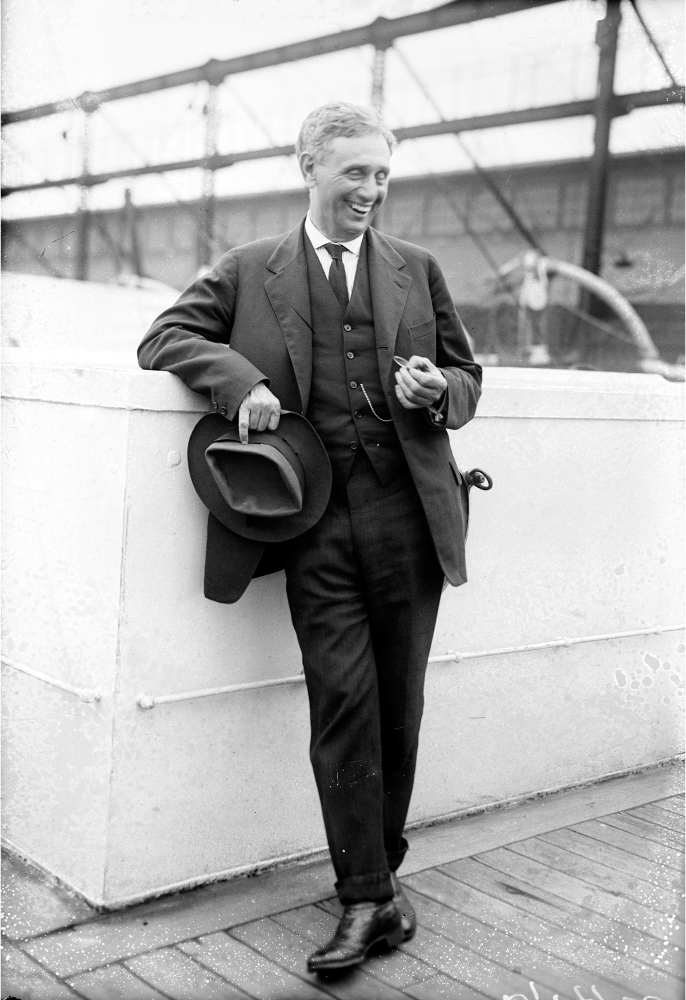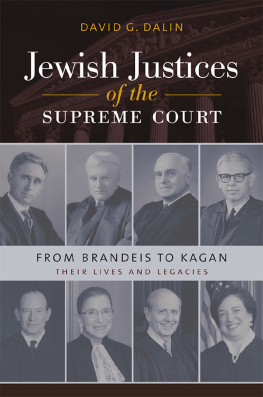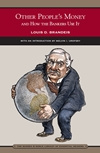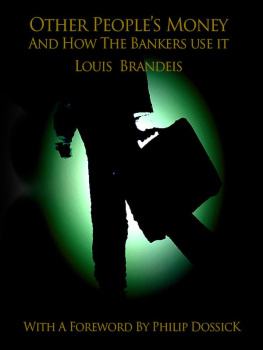LOUIS D. BRANDEIS


Louis D. Brandeis
American Prophet

JEFFREY ROSEN

Copyright 2016 by Jeffrey Rosen.
All rights reserved.
This book may not be reproduced, in whole or in part, including illustrations, in any form (beyond that copying permitted by Sections 107 and 108 of the U.S. Copyright Law and except by reviewers for the public press), without written permission from the publishers.
Yale University Press books may be purchased in quantity for educational, business, or promotional use. For information, please e-mail (U.K. office).
Set in Janson Oldstyle type by Integrated Publishing Solutions.
Printed in the United States of America.
Library of Congress Control Number: 2015957835
ISBN 978-0-300-15867-0 (hardcover : alk. paper)
A catalogue record for this book is available from the British Library.
This paper meets the requirements of ANSI/NISO Z39.481992
(Permanence of Paper).
10 9 8 7 6 5 4 3 2 1
Frontispiece: Louis Brandeis, Library of Congress, Prints and Photographs Division, from the George Grantham Bain Collection, LC-B2-5213-10
ALSO BY JEFFREY ROSEN

The Unwanted Gaze: The Destruction of Privacy in America (2000)
The Naked Crowd: Reclaiming Security and Freedom in an Anxious Age (2004)
The Most Democratic Branch: How the Courts Serve America (2006)
The Supreme Court: The Personalities and Rivalries That Defined America (2007)
Constitution 3.0: Freedom and Technological Change (coeditor, with Benjamin Wittes) (2011)
To the memory of my grandmother
Bertha Wolinsky Katzenberg Gittler
June 15, 1903August 14, 1998
CONTENTS

LOUIS D. BRANDEIS

INTRODUCTION

Isaiah and Jefferson
L OUIS B RANDEIS was the most important American critic of what he called the curse of bigness in government and business since Thomas Jefferson. And in 1934, he was increasingly alarmed about the centralizing tendencies of Franklin D. Roosevelts New Deal. Concerned that big corporations were driving small farmers off their land, Justice Brandeis summoned Adolf Berle and Rexford Tugwell, the Columbia Law professors who had designed the early New Deal agencies, to his austere Washington apartment on California Street. Pacing around the room, which was decorated with prints of classical ruins, Brandeis denounced corporate farming and warned FDRs Brain Trusters that big businesses were controlling the nations destinies. He had voted to uphold the New Deal in the year since FDRs inauguration, he told them, but unless he could see some reversal of the big business trend, he was disposed
The prophet made good on his threat. On May 14, 1935, Brandeis warned Roosevelt through their mutual acolyte and future Supreme Court justice Felix Frankfurter that the eleventh hour of the New Deal was at hand. And two weeks later, on May 27, 1935known as Black Mondaythe court handed down three unanimous opinions striking down elements of the First New Deal on the grounds that they created unchecked, centralized federal power. When Roosevelt first heard of the courts decisions, he was stunned by the justices unanimity.
Well, what about old Isaiah? he asked of Brandeis.
With the majority, his advisor replied.
Isaiah, however, was not finished with his prophecies. He summoned another FDR advisor, Tommy Corcoran, to California Street. (Although the new Supreme Court building had been completed the previous month, Brandeis refused to move into his chambers, viewing the Marble Palace as an extravagant monument to big government.) This is the end of this business of centralization, Brandeis told Corcoran. I want you to go back and tell the President that were not going to let this government centralize everything. Its come to an end. As for your young men, you call them together and tell them to get out of Washingtontell them to go home, back to the states. That is where they must do their work.importance of protecting economic liberty by restoring competition rather than increasing government centralization.
Why did FDR call Brandeis old Isaiah or, in the affectionate letters he wrote until the justices death in 1941, My dear Isaiah? This combination of loyalty to a people defined by justice and righteousness and a universal aspiration to the moral improvement of all free men and women would come to define Brandeiss vision of Zionism and Americanism.
Isaiahs crusades for personal and religious freedom also prefigured Brandeiss own. The prophet foretold the birth of King Cyrus, who, nearly two centuries later, conquered Babylonia and, around 539 BCE, issued a decree permitting the Jewish exiles to return to Israel and to rebuild the Temple as part of his policy of religious tolerance throughout the Persian Empire. Isaiah expressed a fear that the Jewish people would backslide into the moral corruption he had believed caused their exile, emphasizing that ethical behavior was as important as religious ritual. In May 1916, while the Senate was debating Brandeiss Supreme Court nomination, William A. Blackstone, a fundamentalist Protestant clergyman, presented Brandeis and President Woodrow Wilson with a petition comparing Wilson to King Cyrus and urging him to call an international conference to endorse Brandeiss vision of a Jewish homeland in Palestine. Brandeis, in other words, is a spiritual descendant both of Isaiah and of Jefferson, who owned two copies of Xenophons book on the education of Cyrus, Cyropaedia, one of which he inherited from his intellectual mentor, George Wythe. Jefferson was similarly inspired by the great king when he wrote the Virginia Declaration of Religious Freedom.
FDR was not the only one of Brandeiss acquaintances who detected something of the prophet in his countenance. Brandeiss deep ethical sense, rooted in his burning determination to protect individual liberty and economic opportunity for the small manworkers and farmers and producers, who were being menaced by corporations and financiersled him frequently to denounce injustice in a prophetic mode. Here is a firsthand account of Brandeiss prophecies by his law clerk Dean Acheson, who went on to become secretary of state under Harry Truman, another Brandeis admirer, who professed his complete agreement with the justice on the curse of bigness. When a Harvard professor asserted that, in international law, moral principles were no more than relativistic generalizations from the mores of a particular time, Brandeis erupted with fearsome indignation. According to Acheson: The Justice wrapped the mantle of Isaiah around himself, dropped his voice a full octave, jutted his eyebrows forward in a most menacing way and began to prophesy. Morality was truth; and truth had been revealed to man in an unbroken, continuous, and consistent flow by the great prophets and poets of all time. He quoted Goethe in German and Euripides via Gilbert Murray. On it wentan impressive, almost frightening, glimpse of an elemental force.
Next page









